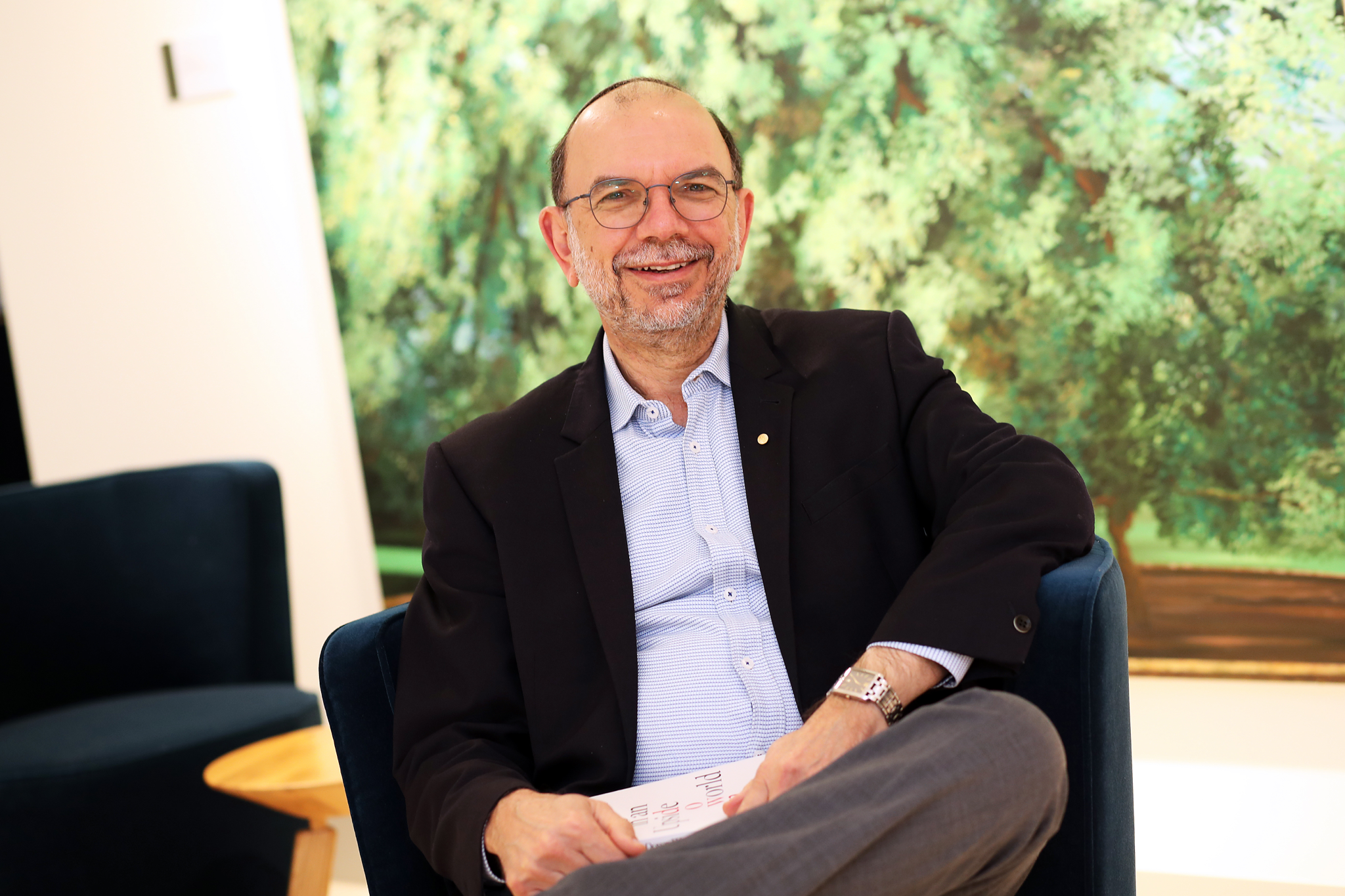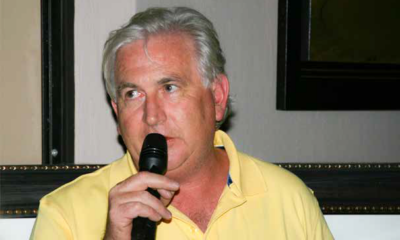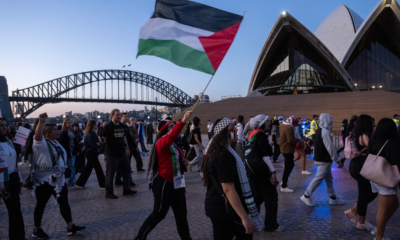
Featured Item

Living the right way up in an upside down world
Published
1 year agoon
South African-born Rabbi Ralph Genende recently launched his book, Living in an Upside Down World, which is a combination of columns he has written. We speak to him.
Why did you choose this name for the book?
The COVID-19 pandemic really turned our lives upside down. The title of the book comes from the Talmud (Pesachim 50a). It tells the story of Joseph, the son of Rabbi Joshua bin Levi, who became deathly ill and was thought to have died. After he suddenly regained consciousness, his father asked him, “What did you see?” Joseph said, “I saw a world turned upside down. What’s above was below, what’s below was above.” His father said to him, “My son, you have seen a clear world, you have seen the world as it is.” And of course, if anything, the world feels even more upside down now.
Tell us about your life before you left South Africa?
I was born in Zimbabwe, but grew up in Johannesburg. I went to school at Yeshiva College under the inspiring Rabbi Tanzer, attended Bnei Akiva, and got my semicha from the revered Rabbi Goldfein and the Johannesburg Beth Din under the outstanding Rabbi Kurtstag. They were all formative influences in my becoming a rabbi. But the truth is, it was my enlistment as a chaplain in the South African Defence Force which motivated me to study full-time to become a rabbi. It was a great way of crystallising the leadership skills I had gained through Bnei Akiva and as youth director at Cyrildene Shul.
How did being a rabbi in South Africa influence the choices you made?
Being in South Africa during apartheid was formative in my passion for social justice and equality. My wife, Caron, a South African who saw the moral complexities more acutely than I did, and I left South Africa with our firstborn son because of the intolerable injustice of apartheid South Africa. But South Africa awakened my social conscience, and I got involved with the formative Jews for Social Justice and began speaking out against apartheid, albeit in a modest way, for example at a protest at the University of the Witwatersrand.
Going to John Vorster Square to visit Maxine Hart, who had been imprisoned for her association with the African National Congress made a deep and lasting impression on me as well. This was following the Soweto riots, which assaulted my soul, and I still have some poems I wrote in the angst of those times.
Tell us about leaving South Africa and settling in New Zealand.
When we moved to New Zealand, it was a powerful breath of fresh air. New Zealand has always been a progressive and liberal society, and it was like discovering a new and beautiful planet. It was here that I realised that the police could be a positive and friendly force for good and not just enforcers of an unjust system.
Part of your ideas on social justice include making space for women. What does this mean to you, and how have you realised it?
I’ve been fortunate to be married to a strong minded and independent woman. She was never a typical rebbetzin, but an individual with her own mind and career. She’s like her stepmother, Eva Bedell, also a powerful proponent for the rights of women.
Being exposed to modern Orthodox rabbis like Rabbi Riskin of Israel and my own reading of tradition and literature led me to the obvious conclusion that orthodoxy needed to be more inclusive of the spiritual space we all share.
I’ve championed women’s inclusion in orthodoxy throughout my life, calling for more Orthodox women to be presidents of Orthodox shuls, to carry the Torah with the same pride as men, to read from the Torah in a halachically-acceptable way, and to ensure that women are represented on Orthodox panels and platforms.
Not everyone appreciates your openminded or progressive sentiments. What impact has this had on you?
I’ve always believed that the role of the rabbi isn’t only to comfort the afflicted, but also to inflict the comfortable.
When you challenge the comfortable, complacent, or those with legitimately different views, you have to be ready to pay the price. While I don’t seek conflict, I do encourage vigorous and respectful debate. I believe that this is what Judaism has always encouraged. You just have to read a page of the Talmud to know what I’m talking about.
I won’t deny that some of the attacks on me have been hurtful, but I’ve developed a thick skin and the ability to discern between those who just seek to undermine or reject and those who are willing to grapple with different and unsettling ideas. I try to understand the other side and respect their views, and I expect the same kind of behaviour from them.
Tell us about your belief on the LGBTQ+ community, and its acceptance in our community.
One of the fundamental challenges facing Judaism today is that of inclusion of members of the LGBTQ+ (lesbian, gay, bisexual, transgender, queer) community.
It’s a fearsome challenge, and there’s no place in any Orthodox synagogue for engaging in homosexual slurs, countenancing members who publicly express hateful, homophobic opinions, and not finding empathy in one’s heart. This isn’t the way of the children of Abraham, the inheritance of his legacy of kindness and compassion. This isn’t the way of a Torah community that lives by halacha, namely, “One shall not say to a person words that hurt or cause harm.” (Sefer Hachinuch 338).
I know this doesn’t reflect the position of the haredi world, nor even of many of the modern Orthodox establishments. I believe we should err on the side of compassion and like Aaron Keller from Yeshiva University would argue, in a clash between humanity and halacha, opt for humanity, put your energy into and have enough faith in halacha that the problem can and will be solved.
What are your views on conversion?
We’re facing a tsunami of intermarriage, and instead of having an aversion to conversion, we should seek the ways of Hillel and many poskim (Jewish legal scholars) to encourage conversion.
How do you respond to increasing attacks on Israel and Jews?
By increasing my love and appreciation of the countless supporters we have. By working with people of goodwill to find an antidote to this vicious virus. By spending my energy educating and encouraging those who are rational pro-vaxxers.
How would you expect people with different opinions to react to your views?
I believe in diversity, I believe in challenging the status quo, I believe in the dignity of our differences, I believe in respectful dialogue. I don’t expect you to agree with everything I say, but I do expect you to be respectful and a mensch in your dealings with people different from you.
Who is this book aimed at, and what do you want them to get from it?
It’s as my publisher, puts it, a collection for anyone – believer or atheist – in need of meaning in our complex turbulent times. I certainly don’t pretend to have all or even many of the answers to the complexity of living now.
It’s about my personal journey but also our collective journey, and I hope that readers will discover some ideas that speak to them, perhaps give them a fresh perspective, and some thoughts that will challenge them.
- To order or enquire about the book, please email: lisa@kesher.net.au










